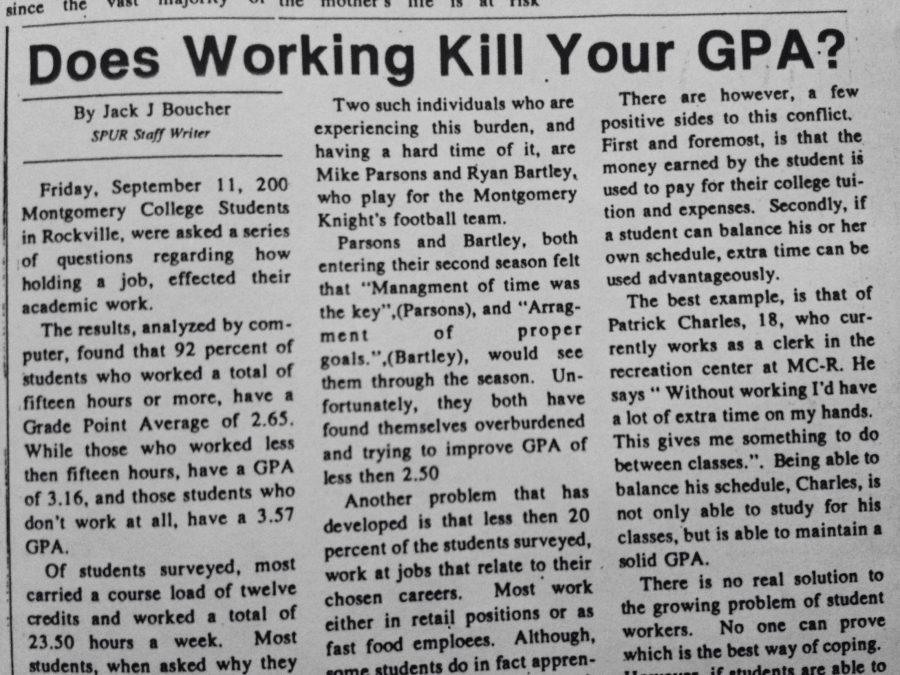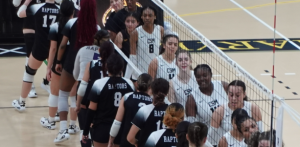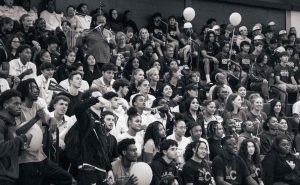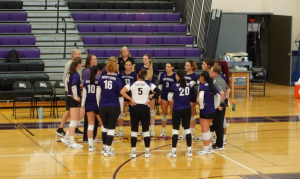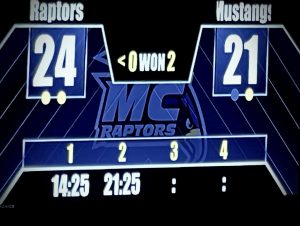Throwback Thursday:Does Working Kill Your GPA?
September 15, 2016
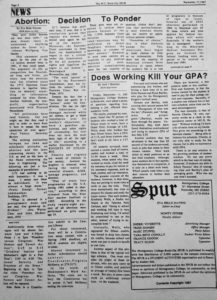
As one of the many students working part-time and putting themselves through school, it’s almost comforting to hear that even back in 1987 that students at MC faced the same tribulations as present day students.
Politicians today have addressed the minimizing of college tuition rates and even making community college free–this could offer the solution people have been searching for almost 30 years.
Please continue to read the article written by Jack J. Boucher, a writer for the Advocate (previously called the Spur) about this issue at Montgomery College.
————————————————————————————-
Friday, September 11, 200 Montgomery College Students in Rockville, were asked a series of questions regarding how holding a job, affected their academic work.
The results, analyzed by computer, found that 92% of students who worked a total of fifteen hours or more, have a Grade Point Average of 2.65. While those who worked less than fifteen hours, have a GPA of 3.16, and those students who don’t work at all, have a 3.57 GPA.
Of students surveyed, most carried a course load of twelve credits and worked a total of 23.50 hours a week. Most students, when asked why they worked so much, cited the need for money to pay for tuition or for necessary expenses, such as food, clothes, and car insurance.
The greatest concern of the students, however, is that since they are putting in more time at work to pay for bills, they have dramatically less time to prepare for classes and study for major exams. One such student Kimberely Wells, a Studio Art major at the Takoma Park Campus, said :going to school and working full time is very frustrating and tiring. I’d rather be committed to one or the other, instead of trying to accomplish both. ”
Ironically, Wells, who registered for fifteen credits, was forced to drop two classes, six credits, because school and work was just too much to handle at one time,.
Another aspect of this problem is that of the typical college athlete. One must consider the plight of these individuals, who not only carry up to fifteen credits, and practice an average of twenty-five hours a week. But also, in some cases work an additional sixteen hours on the weekend.
Two such individuals who are experiencing this burden, and having a hard time of it, are Mike Parsons and Ryan Bartley, both entering their second season felt that “management of time was the key.” (parsons) and “arrangement of proper goals.” (Bartley) would see them through the season. Unfortunately, they both have found themselves overburdened and trying improve GPA of less than 2.50.
Another problem that has developed is that less than 20 percent of students surveyed, work at hobs that relate to their chosen career. Most work ether in retail positions or as fast food employees. Although some students do in fact apprentice themselves to companies, it is only on a short term basis. Which usually ends when a student returns to further their education.
There are however, a few positive sides to this conflict. First and foremost, is that the money earned by the student is used to pay for their college tuition and expenses. Secondly, if a student can balance his or her own schedule, extra time can be used adventurously.
The best example, is that of Patrick Charles, 18, who currently works as a clerk in the recreation center at MC-R. He says “without working I’d have a lot of extra time on my hands. This gives me something to do between classes.” Being able to balance a schedule Charles, is not only able to study for his classes, but is able to maintain a solid GPA.
Their is no real solution to the growing problem of student workers. No on can prove is the best way of coping. However, if students are able to follow Parson’ idea of managing time and Bartley’s plan of arranging goals. Who can say one won’t succeed.


